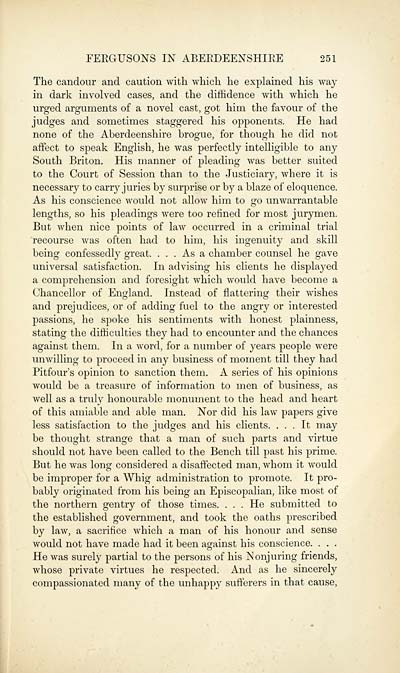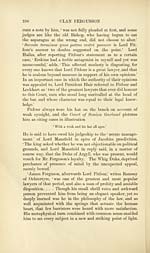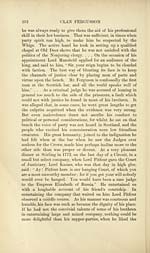Download files
Complete book:
Individual page:
Thumbnail gallery: Grid view | List view

FERGUSONS IN ABERDEENSHIRE 251
The candour and caution with which he explained his way
in dark involved cases, and the diffidence with which he
urged arguments of a novel cast, got hirn the favour of the
judges and sometimes staggered his opponents. He had
none of the Aberdeenshire brogue, for though he did not
affect to speak English, he was perfectly intelligible to any
South Briton. His manner of pleading was better suited
to the Court of Session than to the Justiciary, where it is
necessary to carry juries by surprise or by a blaze of eloquence.
As his conscience would not allow him to go unwarrantable
lengths, so his pleadings were too refined for most jurymen.
But when nice points of law occurred in a criminal trial
recourse was often had to him, his ingenuity and skill
being confessedly great. ... As a chamber counsel he gave
universal satisfaction. In advising his clients he displayed
a comprehension and foresight which would have become a
Chancellor of England. Instead of flattering their wishes
and prejudices, or of adding fuel to the angry or interested
passions, he spoke his sentiments with honest plainness,
stating the difficulties they had to encounter and the chances
against them. In a word, for a number of years people were
unwilling to proceed in any business of moment till they had
Pitfour's opinion to sanction them. A series of his opinions
would be a treasure of information to men of business, as
well as a truly honourable monument to the head and heart
of this amiable and able man. Nor did his law papers give
less satisfaction to the judges and his clients. ... It may
be thought strange that a man of such parts and virtue
should not have been called to the Bench till past his prime.
But he was long considered a disaffected man, whom it would
be improper for a Whig administration to promote. It pro-
bably originated from his being an Episcopalian, like most of
the northern gentry of those times. . . . He submitted to
the established government, and took the oaths prescribed
by law, a sacrifice which a man of his honour and sense
would not have made had it been against his conscience. . . .
He was surely partial to the persons of his Nonjuring friends,
whose private virtues he respected. And as he sincerely
compassionated many of the unhappy sufferers in that cause,
The candour and caution with which he explained his way
in dark involved cases, and the diffidence with which he
urged arguments of a novel cast, got hirn the favour of the
judges and sometimes staggered his opponents. He had
none of the Aberdeenshire brogue, for though he did not
affect to speak English, he was perfectly intelligible to any
South Briton. His manner of pleading was better suited
to the Court of Session than to the Justiciary, where it is
necessary to carry juries by surprise or by a blaze of eloquence.
As his conscience would not allow him to go unwarrantable
lengths, so his pleadings were too refined for most jurymen.
But when nice points of law occurred in a criminal trial
recourse was often had to him, his ingenuity and skill
being confessedly great. ... As a chamber counsel he gave
universal satisfaction. In advising his clients he displayed
a comprehension and foresight which would have become a
Chancellor of England. Instead of flattering their wishes
and prejudices, or of adding fuel to the angry or interested
passions, he spoke his sentiments with honest plainness,
stating the difficulties they had to encounter and the chances
against them. In a word, for a number of years people were
unwilling to proceed in any business of moment till they had
Pitfour's opinion to sanction them. A series of his opinions
would be a treasure of information to men of business, as
well as a truly honourable monument to the head and heart
of this amiable and able man. Nor did his law papers give
less satisfaction to the judges and his clients. ... It may
be thought strange that a man of such parts and virtue
should not have been called to the Bench till past his prime.
But he was long considered a disaffected man, whom it would
be improper for a Whig administration to promote. It pro-
bably originated from his being an Episcopalian, like most of
the northern gentry of those times. . . . He submitted to
the established government, and took the oaths prescribed
by law, a sacrifice which a man of his honour and sense
would not have made had it been against his conscience. . . .
He was surely partial to the persons of his Nonjuring friends,
whose private virtues he respected. And as he sincerely
compassionated many of the unhappy sufferers in that cause,
Set display mode to:
![]() Universal Viewer |
Universal Viewer | ![]() Mirador |
Large image | Transcription
Mirador |
Large image | Transcription
Images and transcriptions on this page, including medium image downloads, may be used under the Creative Commons Attribution 4.0 International Licence unless otherwise stated. ![]()
| Histories of Scottish families > Records of the clan and name of Fergusson, Ferguson and Fergus > (297) Page 251 |
|---|
| Permanent URL | https://digital.nls.uk/95329727 |
|---|
| Description | A selection of almost 400 printed items relating to the history of Scottish families, mostly dating from the 19th and early 20th centuries. Includes memoirs, genealogies and clan histories, with a few produced by emigrant families. The earliest family history goes back to AD 916. |
|---|

